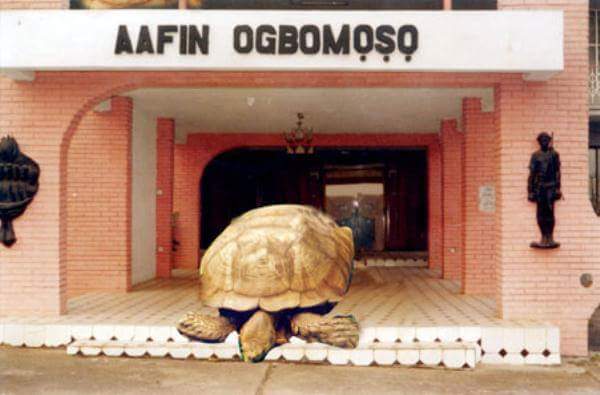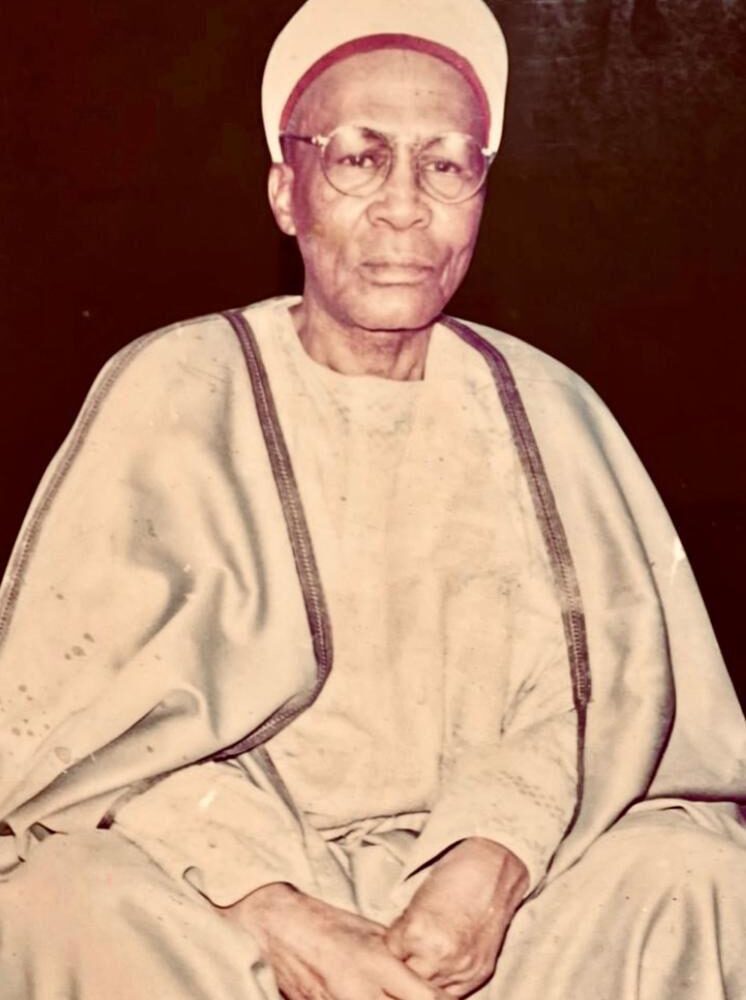OGBOMOSHO was generated from ‘Ogbori Elemọshọ’ when Sọun Ogunlọla, a great hunter, who later became the first Sọun of Ogbomọshọ, helped the old Ọyọ Empire to kill Elemọshọ and brought his head to Alaafin. People began to refer to the settlement of Sọun Ogunlọla as ’Ibi ti wọn ti gbe Ori Elemọshọ’.
Like any history of a people that began before the invention of writing and printing, history was passed from generation by word of mouth. Such history was bound to have some contradictions. Ogbomoso’s history is not peculiar. The name Ogbomoso itself is a contraction of the valiant act performed by a brave and young hunter named Shoun. So any attempt to narrate the history of Ogbomoso would always refer the birth of a baby boy named Shoun. This always raised so many eyebrows among the Chiefs in Ogbomoso. Up until today, it is always a touchy issue. This is so because people have sojourned in what we call Ogbomoso today before Shoun came. For instance, many chiefs accredited Onpetu of Ijeru to have first settled in Ogbomoso. Aresa Olugbon, Onikoyi and other War-Chiefs have settled in Ogbomoso long before Shoun came.
At this point, it is necessary to understand the circumstances that surrounded Shoun’s birth and events that made him a paramount ruler of Ogbomosoland. Shoun’s father was a hunter and he was an Ibariba man. He came to Iresa on a hunting expedition. There he met Aresa’s daughter whom he married. They then moved to Igbo-Igbale the current Oja-Igbo in Ogbomoso. Here they had a baby boy. Messages were sent to Aresa that the new boy would be brought to Iresa for naming and blessing. The Odu Ifa that surfaced was “Iwori Meji”, Ifa predicted that the new baby would be great and famous and would become a mighty king whose name and power would surpass that of Aresa and other chiefs in the Aresa’s kingdom. Ifa went further that the special sacrifice should be made because the child would incur so many enemies that could thwart his destiny. Aresa was pleased with the news; nevertheless he could not contain the fact that his grandson, fathered by an Ibariba, would become more powerful than him and his descendants. Aresa then concluded that it was not necessary to bring such child to Iresa for naming. Aresa then sent his envoy to Igbo-Igbale with the message “Ile gbogbo Ile owo. Awa o ma shin, Ki eyin o ma Shoun”. Aresa instructed the envoy to make sure that the sacrifice was performed under the Iroko tree. The envoy gave the name Shoun to the new baby.
Shoun grew up to become a brave and valiant hunter. He has special magic to become invisible. Such prowess made it possible to hunt dangerous animals such as lions, elephants, leopards, etc. During this time Alafin was at loggerheads with the head of Eso. The Eso resided in the palace and they were the king’s guards. The disagreement escalated and the chief of the Eso was dismissed from the palace. The chief of the Eso sometimes called Elemoso did not take Alafin’s action slightly, he decided to fight back. Elemoso organized Guerilla Warfare on market days or on special occasions. Elemoso would strike and kill market women and children at random. This created an uproar and fear in the minds of Oyo citizens. The Alafin ordered his new Chief of the Eso’s to arrest Elemoso and bring him to Afin dead or alive. This search went on for months; neither the Chief of the Eso’s nor other warlords were able to capture Elemoso. Alafin’ looking for somebody who could bring Elemoso to justice, therefore sent his emissary to all the provinces as far as Benin, Dahomey, Egba, Owu and Ife. All these were of no avail.
Finally, somebody hinted Alafin about a young hunter named Shoun who resided in Igbo Igbale. Immediately Alafin sent for Shoun. When Shoun arrived at the Alafin’s palace, Alafin doubted whether Shoun could capture Elemoso. Shoun urged Alafin to entrust him with the assignment. Alafin finally yielded and Shoun with his invisible juju embarked on the campaign to capture Elemoso. After several weeks, Shoun discovered Elemoso’s tactics. During the day Elemoso would perch on the trees and descend during the night. On one of the market days’ Elemoso climbed a tall palm tree very close to Oja Akesan. He was ready to strike as usual. Shoun spotted Elemoso and before Elemoso struck innocent citizens, Shoun struck first with an arrow. Elemoso fell and Shoun rushed to him, pulled out his sword and beheaded Elemoso. Shoun took Elemoso’s head to the palace. The news spread to all the Yoruba country about Shoun’s valor. Immediately Alafin gave him clothes, beads, and a staff of office as War Chief and Bale. So people came from far and near to see this young hunter who beheaded Elemoso. As people came they nicknamed Shoun as “Ogbori Elemoso” This was contracted to Ogbelemoso, later to Ogbemoso and finally to Ogbomoso.
Warriors and brave men and women populated Ogbomoso. They were fearless and fierce in battle. Many wars fought but none was able to capture Ogbomoso town ship. Several war Chiefs rose to the rank of Are Onakakanfo in the Alafin’s Army. For instance, Toyege and Ojo Aburumaku were distinguished Are Onakakanfo. In recent time two famous Ogbomoso sons became Are Onakakanfo. They were Chief Samuel Oladoke Akintola an orator, journalist and tactful politician who rose to the rank of the Premier of the Old Western Region of Nigeria; and Colonel Benjamin Adekunle a brave and dignified soldier, who became the Are Onakakanfo of Yorubaland after the Nigerian Civil War.
Several War Chiefs, who either became dissatisfied with Shoun or disagreed with his positions in some military campaigns, joined the Oyo, Ibadan or Ilorin army. One case in view was “Ibikunle the Mighty!” He was a native of Ogbomoso and like many of the warrior-Chieftains of Ibadan, he defected the Ogbomoso army in protest of Bale Ogbomoso’s activities during Eleduwe’s War. On arrival at Ibadan he went and lived with another war chief, Toki Onibudo. This Chief was the Lord of all the area of Ibadan, which is still called Ayeye today. In Toki Onibudo’s household, Ibikunle became the captain of the soldiers retained by Onibudo. In this position, Ibikunle distinguished himself as a great soldier and was known as the “Lion of Onibudo’s Camp.” As was the practice in those days, Ibikunle succeeded Onibudo after the latter’s death. Ibikunle fought valiantly in many wars in which Ibadan troops were engaged. By 1851, after returning from the Opin expedition in the Ekiti region, he was appointed the Balogun of Ibadan.
In religious affairs, Ogbomoso has been in the forefront of Christian Ministry. Ogbmoso is the center of the Nigeria Baptist Mission.
LIST OF SOUN OF OGBOMOSO 1659 A. D. TO PRESENT
1. OBA OLABANJO OGUNLOLA OGUNDIRAN 1659 – 1714
2. OBA ERINSABA ALAMU JOGIORO 1741 – 1770
3. OBA IKUMOYEDE AJO 1770 – 1797
4. OBA TOYEJE AKANNI (Aare Onakakanfo of Yorubaland) 1797 – 1825
5. OBA OLUWUSI AREMU 1826 – 1840
6. OBA JAIYEOLA ARE AROLOFIN ALAO 1840 – 1842
7. OBA IDOWU BOLANTA ADI 1842 – 1845
8. OBA OGUNLABI ODUNLARO 1845 – 1860
9. OBA OJO ABURUMAKU ADIO 1860 – 1869
(Aare Onakakanfo of Yorubaland)
10. OBA GBAGUNGBOYE AJAMASA AJAGUNGBADE I 1869 – 1871
11. OBA LAOYE ATANDa 1871 – 1901
12. OBA MAJENGBASAN ELEPO I 1901 – 1907
13. OBA ADEGOKE ATANDA LAYODE I 1908 – 1914
14. OBA ITABIYI OLANREWAJU ANDE 1914 – 1916
15. OBA BELLO AFOLABI OYEWUMI AJAGUNGBADE II 1916 – 2/18/ 1940
16. OBA LAWANI OKE ‘LANIPEKUN 10/16/1944 – 3/19/1952
17. OBA OLATUNJI ALAO ELEPO II 1952 – 1966
18. OBA OLAJIDE OLAYODE, II 7/22/1966 – 7/1/1969
19. OBA SALAMI AJIBOYE ITABIYI 6/4/1972 – 6/2/1973
20. OBA OLADUNNI OYEWUMI AJAGUNGBADE III 10/24/1973 – PRESENT
OGBOMOSO ANTHEM
COMPOSED BY
LATE Mr. D. OLADELE AJAO
Former Senior Tutor, Baptist College, Iwo
OGBOMOSO PATRIOTIC SONG
1. Ogbomoso Ajilete
Si ogo re l’ a afe korin
Iwo t’ate s’arin odan
Okan ninu ilu Akin.
2. A-to-sa-si n’jo t’o buru
Abo feniti eru mba
Odi t’ota ko le parun
Ogun Filani ko ri mi.
3. Oluwa Olodumare
F’owo otun Re d’ilu wa mu
F’oba at’awon ‘gbimo wa
L’emi at’ife ododo.
4. Kede re fun gbogbo eda
Egan ni “he” erin gobi
Ajanaku po, o ju ra
Ilu na l’lola gbangba ni.
5. N’ijo ‘re elere ni iwa
Bise ya, a se kangun ni
Omo Soun fe ilu won
Ilu won ni orisa won.
6. So f’awon wundia ti ndan
Fawon okunrin rogbodo
E ho ye, e sape, e fo
Ilu ‘ bukun l’a bi nyin si.
7. Awon odo Ogbomoso
Yanrin ‘ta re, ilu wa
Koto pelu gegele re
Igbo odan re l’ayo wa.
8. Ki lo le mu wa gbagbe re
Ilu ‘telorun at’ayo
Titi a o fi s’asunji
L’a o ma korin iyin re.
.





